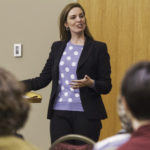NASHVILLE, Tenn. (BNG)—Southern Baptist women were decades ahead of the male leaders of their denomination in improving race relations among Baptists in the 20th century, a group of historians said.
 Melody Maxwell and Laine ScalesStatements and proclamations by male denominational leaders record much of the history of Southern Baptist Convention race relations. But Southern Baptist women had been developing friendships and cooperation with African-American women through relationships created by Woman’s Missionary Union, a panel on Southern Baptist women and race between 1930 and 1970 said.
Melody Maxwell and Laine ScalesStatements and proclamations by male denominational leaders record much of the history of Southern Baptist Convention race relations. But Southern Baptist women had been developing friendships and cooperation with African-American women through relationships created by Woman’s Missionary Union, a panel on Southern Baptist women and race between 1930 and 1970 said.
“I would argue that the strongest promotion of racial justice within this period came from Southern Baptist women,” Melody Maxwell, assistant professor of Christian studies at Howard Payne University, said in a breakout session during the Baptist History and Heritage Society meeting in Nashville, Tenn.
Laine Scales, professor of higher education and assistant dean at Baylor University, said personal friendships between black and white Baptist women date to 1901, when the Women’s Convention, the women’s auxiliary connected to the National Baptist Convention, USA, Inc., invited Woman’s Missionary Union Corresponding Secretary Annie Armstrong to address the convention in Cincinnati.
 Annie ArmstrongAt the meeting, the two groups established a jointly funded project to support two African-American missionaries to work in the American South.
Annie ArmstrongAt the meeting, the two groups established a jointly funded project to support two African-American missionaries to work in the American South.
The two groups held a joint meeting in 1904, the first desegregated gathering of Baptist women in the South. The joint funding projects continued, leading to a long line of friendships between WMU leaders and Nannie Helen Burroughs, Armstrong’s counterpart in the Women’s Convention.
Nicholas Pruitt, a doctoral student in history at Baylor, said Burroughs adopted a “third position” between the self-help educational stance of Booker T. Washington and civil-rights activism of W.E.B. DuBois.
Curriculum at the Women’s Convention training school involved both Bible study and instruction in how to keep a clean and orderly home, to equip students for paid domestic work in white households, Scales said.
The WMU magazine Royal Service stopped short of promoting direct involvement in the civil rights movement, but as early as 1946 identified race as “the most acute world problem of today,” Maxwell said.
Sign up for our weekly edition and get all our headlines in your inbox on Thursdays
 Nannie Helen BurroughsArticles called for improved attitudes concerning racial prejudice, opposed the Ku Klux Klan and issued proclamations including “in the heart of God, black is as beautiful as white.”
Nannie Helen BurroughsArticles called for improved attitudes concerning racial prejudice, opposed the Ku Klux Klan and issued proclamations including “in the heart of God, black is as beautiful as white.”
By the 1960s, Royal Service described a “new urgency in these days” for racial equality and urged readers to oppose all forms of prejudice and racial injustice.
One reason race was at the forefront of WMU’s concern was that the race crisis in the United States had become a hindrance to foreign missions, Maxwell said.
“Many WMU leaders believed the future of missions was at stake in the debate over racial equality,” Maxwell said. “So if missions is important, we better have some compassion toward African-Americans in order to not look like fools around the world.”
On many occasions, Maxwell said, Royal Service quoted SBC leaders with alarming statements such as foreign mission efforts were “gravely imperiled by the racial problem in our country.”
 Nicholas Pruitt“They explained, as you might understand, that people in other countries were pretty reluctant to accept the gospel from Southern Baptist missionaries when they see all these headlines about the inequality occurring in the South and viewed Southern Baptists in that context,” she said.
Nicholas Pruitt“They explained, as you might understand, that people in other countries were pretty reluctant to accept the gospel from Southern Baptist missionaries when they see all these headlines about the inequality occurring in the South and viewed Southern Baptists in that context,” she said.
“Many refused to listen to Southern Baptist missionaries, while others became angry, and effectively threatened our entire missionary program.”
While not overtly supporting the civil rights movement, Maxwell said, WMU publications promoted “contextually progressive ideas” that reached thousands of Southern Baptist women and “instilled a gradual understanding of changing race relations.”
The Baptist History and Heritage Society is a nonprofit national organization of Baptist historians and other individuals and partner institutions committed to communicating the story of Baptists through the study, interpretation, publication and advocacy of Baptist history.














We seek to connect God’s story and God’s people around the world. To learn more about God’s story, click here.
Send comments and feedback to Eric Black, our editor. For comments to be published, please specify “letter to the editor.” Maximum length for publication is 300 words.